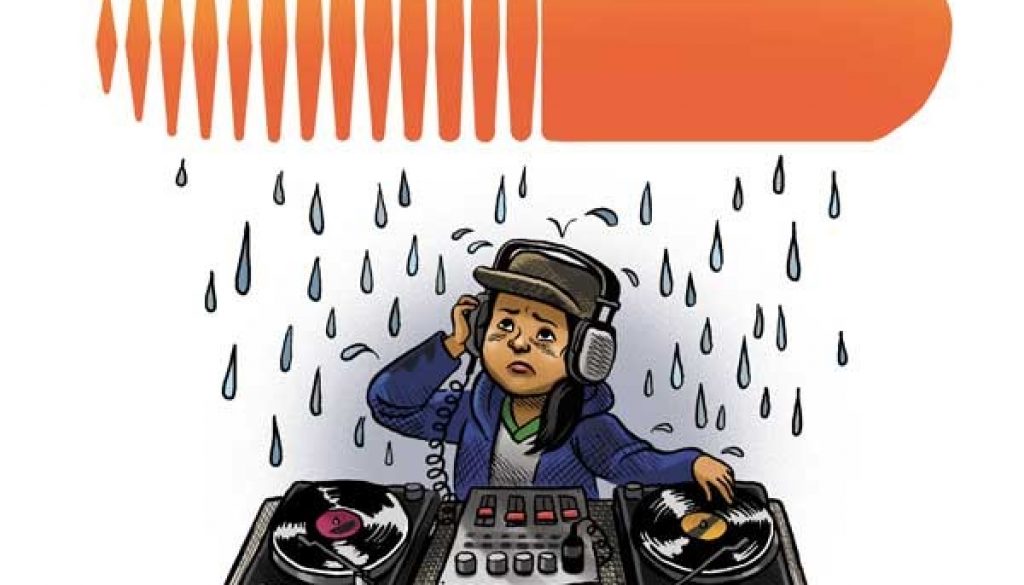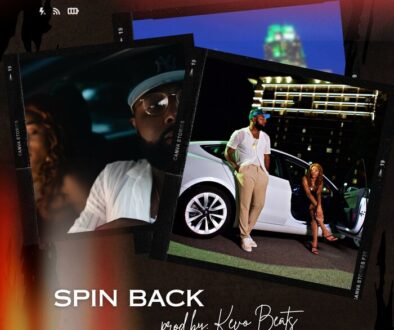Soundcloud Raining on its Own Parade. Copyright Concerns For Digital DJs
New copyright practices come down hard on the DJs who helped make it one of the most promising music-hosting services on the Web.
SoundCloud is one of the most promising sites stealing MySpace’s music market share. Founded in Berlin in 2007, it improves on MySpace’s music service for both artists and fans. Its player runs smoothly and predictably, usually with little or no lag, and gives users the option to make any song downloadable for free—a feature MySpace discontinued years ago. SoundCloud displays a waveform for each track, and allows listeners to tag specific points on it—the transition to the bridge, say, or a DJ’s segue between songs—with comments. The service is free for nonpremium users, who can keep up to two hours of material on their accounts.
SoundCloud conspicuously advocates for Creative Commons licensing, a progressive alternative to traditional copyright, by foregrounding it on its home page and pitching it to users as part of the sign-up process. And until recently the site has seemed to take a hands-off approach to the content it hosts, perhaps because it hasn’t become a popular channel for pirates—SoundCloud assigns a separate player widget to each track, so people looking to share entire albums tend to prefer sites like RapidShare and Mediafire, which make such an operation considerably simpler and more anonymous. SoundCloud’s apparent laissez-faire attitude, along with its affordable ways to share hour-plus tracks, has made it especially popular with DJs, who have so far been its most numerous and vocal users.
But DJ dominance of SoundCloud may be coming to an end… Meet the world of intellectual property law
The world of intellectual property law is quite relevant to musicians, especially DJs and producers that sample other people’s material in performance and composition. In this article, Exposed Vocals is provide some general tips for navigating this confusing, potentially treacherous landscape, so read on as we explain the basics behind laws that apply when remixing in your bedroom or playing a mashup routine live. However, please be aware that this article is written from the perspective of United States law. The spirit of most other national copyright laws is similar that of the U.S, but there are often important differences.
A copyright is an exclusive right, granted by the government, to the author of a particular work.
This includes (among other things) the right to copy and distribute the work, the right to be credited for the work, and the right to determine who may publicly perform, adapt, or benefit financially from the work. For the purposes of this article, you can think of a “work” as a song. However, the copyright to a musical composition covers not just the final mix, but all of the original stems in a master recording as well!
There are two “sides” to music copyrights: a master side and a publishing side. The master side covers the sound recording, while the publishing side covers the underlying composition.
This might take the form of (among other things)
- illegally copying or distributing a song
- failing to give proper credit to the owner of a song
- playing, remixing or financially exploiting a song without proper permission.
If you write and produce music, you probably already know that registering a copyright in the States is pretty easy. You fill out a form at copyright.gov, pay the fee, and send two hard copies of your work to the U.S. Copyright Office. Also, be aware that master and publishing copyrights are registered separately.
Remixes are more complex. Legally speaking, a remix is a “derivative work”; that is a new work based upon an original work. According to the letter of the law, you need permission from the copyright holder of the original work in order to create a derivative work. You can and should discuss copyright issues with the owner of the original song. By doing an official remix, you’ve written at least part of a new song, which means that you’re entitled to a proportional part of the publishing side of the new copyright. If you’re not being paid anything up front, that’s all the more reason to ask for this. Paying percentages on the publishing side of a copyright is less of a headache for labels because performance-rights organizations like ASCAP, BMI and SESAC do most of the dirty work. Just make sure you register with them if and when you do receive a songwriting credit.
Live performance is a different story altogether.
If the songs you play are your own, there’s likely nothing to worry about. With most DJs, unless you’re Daft Punk or Deadmau5, this is probably not the case. When you play other peoples’ music, there are copyright implications. In that situation, the artist whose music is being played is entitled to a public performance royalty (again, generally handled through ASCAP or BMI).
Fortunately for you, industry custom dictates that these royalties are the responsibility of the club, not the DJ. If you’re mixing songs and not just playing out full tracks, there are additional considerations to be aware of. Creating a live remix during one of your sets is not usually a problem, provided that you own the mp3s, CDs, or vinyl that you’re using and the venue at which you’re mixing pays the appropriate public performance royalties. Selling or distributing a live or unofficial remix, however, brings in a different set of rules. The copyright significance of unofficial (bootleg) remixes is complex and ultimately depends to a large degree on what you’re trying to do with the remix in question. When you remix a song, you’ve created what copyright law calls a “derivative work”. Generally, one is supposed to have permission from the original copyright owner to create and/or distribute that derivative work. Without this permission, you’ve committed infringement.
here is, however, a doctrine of copyright law called Fair Use that creates a limited exception to this rule.
Fair Use is a defense to copyright infringement designed to encourage innovation, parody, and other beneficial results. The applicability of Fair Use to a given case is analyzed through four questions, which I’ve contextualized below. Here are the questions as they would relate to an unofficial remix:
- What was the purpose of the remix? If it can be viewed as a progression or commentary on the original, you’re better off than if it simply tries to “cash-in” on a tune that someone else wrote.
- What was the availability of the original song, and had it been released yet? It’s tougher to claim Fair Use if your remix is based on an advance or an unreleased track, because copyright law strives to protect the decision-making process of the original author as he decides whether or not to make his work public.
- How much of the original song did you use in your remix? Looping just two bars of bass from the original with a host of new stems is much more likely be viewed as Fair Use than playing a song start-to-finish and adding a few vocals.
- Has your remix diminished the value of the original song to the copyright holder? This isn’t confined to the idea that people might prefer the remix to the original when buying a record (since everyone’s doing so much of that lately); it’s relevant to licensing opportunities in film, television and commercials as well.
SoundCloud is at a crossroads here. Right now its practices appear to defer to rights holders, allowing labels and publishing companies to determine almost unilaterally what counts as infringement—a stance that puts an undue burden on uploaders whose employment of copyrighted material might meet the criteria for fair use. Were SoundCloud to take the nobler and more difficult path, it would devise a policy that could differentiate between DJs and remixers on one hand and pirates on the other. Of course, it’s easier and cheaper for SoundCloud to just keep serving DMCA notices to its most passionate users—though taking that route could drive off enough of them to make it very expensive indeed.
If it becomes too annoying, people are going to pick up and move to the next thing.



